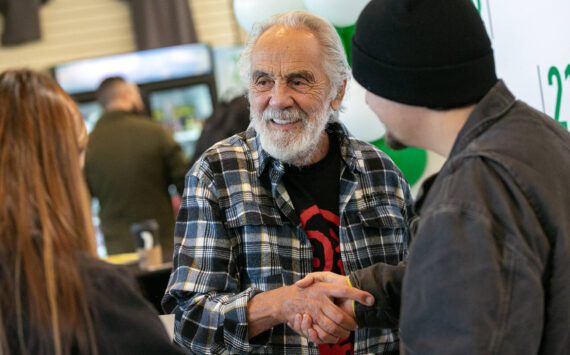By Morf Morford, Tacoma Daily Index
If that email opens with “Dear” or “Beloved”, you probably aren’t
You may have noticed that we have holidays that celebrate/commemorate/recognize various events or figures in our history or tradition.
From Labor Day to Halloween to Columbus Day, we have holidays celebrated, ignored or even disdained by many of us.
I propose a holiday, or at least a day of remembrance for something I think we all do, but rarely acknowledge; say the exact opposite of what we actually intend to express. We tend to do this without thinking about it – we are inclined to say these kinds of statements almost reflexively.
Some seem to be celebrating early
I was thinking of this as a result of picking up my granddaughter to give her a ride to school. She got in the car, and jumped out almost immediately saying, “I forgot something!”
When she got back with the forgotten item, I said, “You said you forgot something, but what you really meant was ‘I remembered something’”.
What followed was a short conversation on how we often say the direct opposite of what we thought we were going to say.
As I started listening to others, from news anchors to overheard conversations, I began to notice this principle nearly constantly in everyday conversations.
The principle of making a statement, partially as an evasion and perhaps partly obfuscation, and with the intent, perhaps to convince ourselves as much as any others, is as old as words themselves, and embedded in human communication from the very beginning.
The lady doth protest too much, methinks – Shakespeare’s Hamlet
I grew up with the assumption, apparently absorbed from nowhere, that the louder and more firmly one made their case, the more firmly they believed it to be true. Life has shown me the louder and more firmly (and often how frantic, even tearful) the argument/denial/assertion might be made, the more likely it is to be false – if not entirely fictional – and the volume and intensity is, at minimum, intended to convince the person themselves more than anyone else.
We see these statements in public, in private and even in legal or courtroom sessions.
For whatever reason, politicians and public figures excel in these kinds of inverted statements.
Here are just a few that I have noticed…
I’m not drunk
Based on your experience, when does someone say this?
I’m not tired
This could be described as the children’s version of the statement above.
I’m doing the best I can
If your day is going well, and you are making progress, or at least positive movement, you are unlikely to say this. But if your day is falling apart and you know you are barely functioning, you just might find yourself using this phrase – precisely because you know it isn’t true.
I know all about cars/computers/women
This is a favorite among a certain category of men – those who are (or at least proclaim themselves to be) experts in virtually every essential category of life.
From transportation to work to technology and relationships, and politics, if not everything else, these self-proclaimed experts declare themselves, by something like divine intervention, incontrovertible experts.
To put it simply, they are not. Humor them if you must, but do not listen to them.
It’s not about the money
If someone insists that it is NOT about the money, you know that it is.
I’m fine
Every guy needs to know that if he hears this term from the woman in his life, the fuse is short. Make sure your insurance is up to date.
It’s not my fault/ I wasn’t even there/ I don’t know him/her
It would be difficult to come up with a clearer confession.
Only one thing wrong with it…
If there is only “one thing” wrong with something, you know that it is a deal-breaker.
You can trust me/Have I ever lied to you?
If they haven’t lied before, they will soon.
Strong opinions?
Know anyone with “strong opinions”?
In a normal setting, “strong” would mean solid and established or grounded in facts and documentation. This is not what it means to most of us. It has come to mean loud, rude, inflexible, fearful and self-righteous. And not “strong” at all.
What could go wrong?
As most of us know, this question is asked only (and I do mean only) when a thoroughly obvious (and preventable) catastrophe is about to be unleashed.
The louder he talked of his honor, the faster we counted our spoons. -Ralph Waldo Emerson, The Conduct of Life
When someone brags about how honest they are, lock up any valuables. Now.
Dear Valid User
If you get an email with this introduction, you might be the only “valid” one.
Monetize this
This is yet another case of saying something precisely because it isn’t true. If we need to “monetize” a good or service, it is exactly because we have not figured out how to do so.
Since “monetizing” goods is, in most cases, fairly straightforward, “monetizing” services, especially services previously free, can be, understandably, a challenge.
The shift from Twitter to X, and free to subscription, with a loss of market value in the billions (and alienation of long-term sources of revenue), will be a topic of discussion, and, one would hope, a lesson learned, in business circles, for decades to come.
Biggest Takeaway
In a simpler time, the phrase was “the lesson to be learned” or “the moral of the story is…”, but we, in our love of convoluted metaphors, need to use terms like “biggest takeaway”.
I’m doing this for you
From officious public figures to abusive parents to religious or sports “leaders”, there are few forces in the word more terrifying than those willing (even eager) to foist their obsessions or frenzies upon us than those who do their best to persuade us (or themselves) that they are doing some act of depredation or violence “for your own good”.
She’s the sort of woman who lives for others – you can tell the others by their hunted expression. -C.S. Lewis, The Screwtape Letters
At first I was thinking that a suitable “opposite” commemoration would be one that had a focus on “opposite” statements, but after some thought I realized that a more suitable recognition, more in the spirit of “opposite” would be a day without opposite statements.
Maybe the public figures and miscellaneous blowhards among us would appreciate a day off.
Yeah, right…





